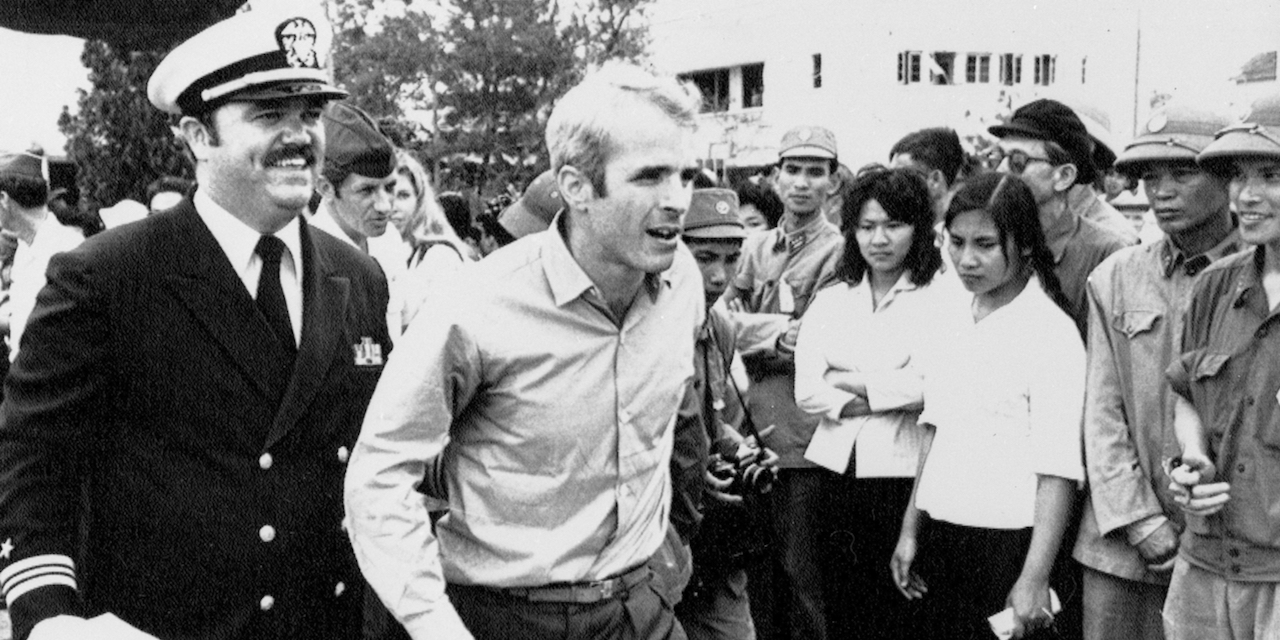- The Pentagon on Monday said it would not return the flag to half-staff to honor Sen. John McCain, a Vietnam War hero who died Saturday at 81, unless the White House issued a proclamation.
- A Pentagon representative on Monday told Business Insider via phone that the flag would remain at full staff unless President Donald Trump took action.
- Trump has repeatedly made clear he is no fan of the longtime Republican senator, and many think the lack of honors stems from the president’s disdain.
- McCain spent over five years as a prisoner of war in Vietnam subjected to brutal torture.
- He remained a tireless advocate for the military to the end of his days.
The Pentagon on Monday said it would not return the flag to half-staff to honor Sen. John McCain, a Vietnam War hero who died Saturday at 81, unless the White House issued a proclamation.
The Department of Defense flew the flag at half-staff on Saturday night and Sunday, per the US Flag Code. A Pentagon representative on Monday told Business Insider via phone that the flag would remain at full staff unless President Donald Trump took action.
The White House also returned the flag to full staff on Monday.
Despite his war record and his leadership with and lifelong advocacy for the US military, McCain has received short-lived honors at the Pentagon and the White House.
Flag back at full staff atop WH. Pres Trump did not issue proclamation on the death of @SenJohnMcCain, which usually calls for flags to remain at half-staff through the day of interment, which is Sunday at the @NavalAcademy. pic.twitter.com/NGasNPT0VB
— Mark Knoller (@markknoller) August 27, 2018
Trump is breaking with tradition
In the past, when a prominent public official died, the president often would issue a proclamation calling for flags at government and military buildings to be flown at half-staff through the day of the person's interment. President Barack Obama issued such a proclamation after the death of Supreme Court Justice Antonin Scalia in 2016, for example.
So while it's not required for presidents to call for the flag to remain at half-staff after the deaths of public officials beyond what is dictated by the US Flag Code, it has become customary.
But the White House has shown no signs that it plans to follow tradition to honor McCain, and many think that is directly linked to Trump's disdain for the Arizona Republican, who was one of the president's harshest critics.
Just one day later, at the Pentagon, headquarters of the @DeptofDefense military and @USNavy he loved, the flag is flying business as usual, awaiting @realDonaldTrump or Secretary Mattis, or the Navy to decide US goverment and military/Navy installations should lower in respect. pic.twitter.com/h87vAOvowr
— Barbara Starr (@bstarrreports) August 27, 2018
Trump's grudge against McCain
Trump has repeatedly made clear he is no fan of McCain.
During the 2016 presidential campaign, for example, Trump controversially suggested he did not believe the senator was a war hero because he'd been captured and spent time as a prisoner of war in Vietnam.
"He's not a war hero," Trump, who received five draft deferments during the Vietnam War, said of McCain. "He's a war hero because he was captured. I like people that weren't captured."
Trump also reportedly rejected plans to release a statement praising McCain following his death.
The president has repeatedly painted himself as an undying champion of service members and veterans, but that praise often ends if they publicly criticize him.
McCain is widely respected for his military service
McCain was born on a naval base in Panama and came from a military family with a long record of service. He was the son and grandson of Navy admirals, and he studied at the US Naval Academy in Annapolis, Maryland.
After graduating, McCain entered flight school in 1958. He was deployed to Vietnam nine years later.
McCain's Skyhawk dive bomber was shot down in Hanoi in 1967, breaking both his arms and shattering his leg in the process. He was promptly captured and thrown in the infamous "Hanoi Hilton" prison.
Roughly a year into McCain's imprisonment, his captors offered to set him free after discovering his father had just been made commander of US forces in the Pacific. They thought that releasing McCain would be a propaganda victory.
But McCain refused this opportunity at freedom over loyalty to his fellow American POWs, some of whom had been held in captivity longer than he had. Consequently, McCain was brutally tortured.
McCain was a POW from October 1967 to March 1973, spending roughly two of those years in solitary confinement in a windowless 10-by-10-foot cell.
He never fully recovered from the wounds he sustained in Vietnam; he couldn't raise his arms above his head for the rest of his life.
By the end of McCain's military service in 1981, his decorations included the Silver Star Medal, the Legion of Merit with Combat "V" and one gold star, the Distinguished Flying Cross, the Bronze Star Medal with Combat "V" and two gold stars, and the Purple Heart with one gold star.
There are bipartisan calls for the flag to be lowered
Senate Minority Leader Chuck Schumer and Majority Leader Mitch McConnell are calling on the Department of Defense to "provide necessary support so that U.S. flags on all government buildings remain at half mast through sunset on the day of Senator McCain's" interment, according to a tweet from Schumer's communications director.
Other members of Congress, including Democratic Rep. Ted Lieu, an Air Force veteran, have also called on the Pentagon and Defense Secretary James Mattis to act.
Lieu said in a tweet that lowering the flag until McCain's interment would be the "honorable thing to do" based on his military service.
The nonpartisan organization American Veterans also ripped into the White House for its decision to raise the flag on Monday.
"By lowering flags for not one second more than the bare minimum required by law, despite a long-standing tradition of lowering flags until the funeral, the White House is openly showcasing its blatant disrespect for Senator McCain's many decades of service and sacrifice to our country as well as the service of all his fellow veterans," it said in a statement.
McCain worked to bring peace between Vietnam and the US
Years after the war, McCain, as a US senator, worked closely with former Sen. John Kerry to normalize relations with Vietnam.
Following his death, McCain was mourned widely in Vietnam and applauded for his efforts to reestablish ties between the US and Vietnamese governments.
Even McCain's former jailer - the man who oversaw the Hanoi Hilton - paid his respects to the former Navy pilot and said he'd admired him for his "toughness."
There's a Navy destroyer named after McCain, but the flag still apparently won't be flown at half-staff for him
The USS John S. McCain, a guided-missile destroyer in service of the Navy, was originally named for McCain's father and grandfather.
But on July 12, McCain was inducted by the secretary of the Navy into the official namesake of the vessel.
"As a warrior and a statesman who has always put country first, Sen. John McCain never asked for this honor, and he would never seek it," Secretary of the Navy Richard V. Spencer said at the time. "But we would be remiss if we did not etch his name alongside his illustrious forebears, because this country would not be the same were it not for the courageous service of all three of these great men."
McCain will be laid to rest in Annapolis
McCain died from brain cancer on Saturday in his home state of Arizona.
The former Navy pilot, US senator, and two-time presidential contender will be laid to rest at the US Naval Academy in Annapolis on Sunday.
McCain will be buried in a plot next to his Naval Academy classmate and lifelong friend Adm. Chuck Larson.

